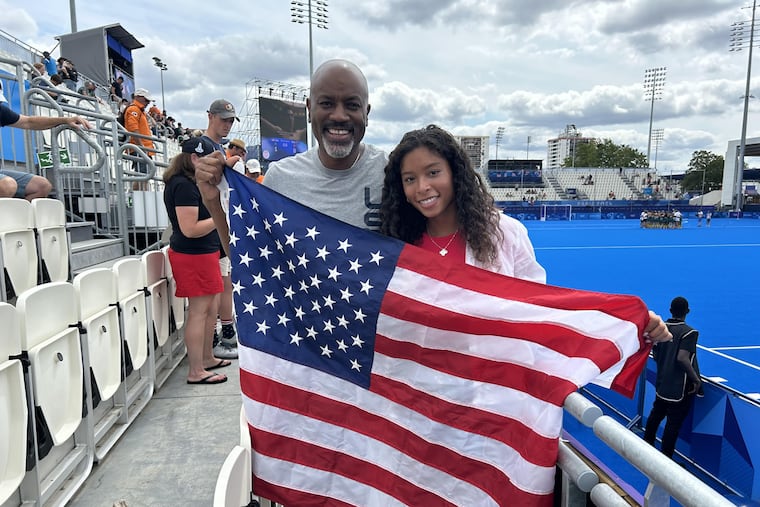Billy King wants to help build U.S. field hockey. He’s pretty much starting from the ground floor.
King, whose daughter is a top goalie prospect and has one year left at The Hill School, has been on USA Field Hockey’s board of governors and hopes to build the sport into something it has never been.

COLOMBES, France — The usually nonstop meetings and Zoom calls for the executive search firm for which he works promised to slow down some. So Billy King brought his family here as a sign of his commitment to stretching the reach and increasing the cultural power of the sport that his daughter loves.
Natane King has one year left at The Hill School in Pottstown before heading off to Syracuse University to study mechanical engineering and play field hockey. Her rise into one of the nation’s top goalkeeping prospects inspired her father to wield some of the influence he has to make field hockey something more than an afterthought in America’s mainstream athletic scene.
King hasn’t been an NBA general manager since his tenure with the Nets ended in 2016, and it has been 17 years since he was the Sixers’ president and GM. But for a year-and-a-half now, he has been on USA Field Hockey’s board of governors, and his job now, as the managing director of Turnkey ZRG in Haddonfield, keeps him in contact with plenty of power people in pro sports.
“He is the most experienced sports executive on the board,” said Simon Hoskins, the chief executive officer of USA Hockey. “When he speaks in our boardroom, he comes with a lot of knowledge, and he’s a mentor, too. He’s got amazing connections within the sports world with advisers.”
Those kinds of relationships — with philanthropists and sponsors, with deep pockets and an interest in spending what’s in them — might be the best hope to build the U.S. field hockey program into something it has never been. Over the 24 field hockey tournaments in Olympic history, the United States has come away with just one medal, a bronze in 1984. In these Games, the U.S. finished 1-3-1 in pool play, beating winless South Africa 1-0 on Saturday at Yves-du-Manoir Stadium — with King, his wife, Melanie, and their three children in attendance.
He had been a field hockey novice until Natane started playing while she was a student at Episcopal Academy. “I didn’t know anything,” he said. Now he wants to help grow the game around the country, a challenge considering that USA Field Hockey receives no government funding and the sport’s top talent is concentrated so heavily in one geographic area. Of the 16 players on the Olympic roster, 13 are from the East Coast, including nine from Pennsylvania.
» READ MORE: Penn State’s Stephen Nedoroscik, Rubik’s Cuber extraordinaire, solved the puzzle of Olympic stardom
“It’s hard because that’s where so many players come from,” King said. “Texas is starting to grow. Chicago has some club teams. There’s a couple on the West Coast. It just takes exposure. Adding Stanford to the ACC will help because the ACC is one of the stronger conferences.”
The difference between the U.S. and most of its opponents here was obvious even to someone with untrained eyes. Australia dominated the Americans, 3-0, on Wednesday, its players stronger on the ball, controlling it for much of the game and fanning out to run set formations and plays that required timing and anticipation that coach Dave Passmore’s young team couldn’t match. (The average age of a player on the U.S. team is 24.) Against South Africa, the U.S.’s conservative, defensive-oriented style clamped down on a lesser South African team, but Saturday was the only time that approach worked in the pool round.
“Like, look right here,” Natane said as a member of Team USA tried to chase down a long outlet pass on South Africa’s side of the pitch. “There’s only one person ahead right now.”
The kid sounded pretty smart about the sport. Maybe in a few years, with some help from her dad, she’ll be in a position to do something about it.